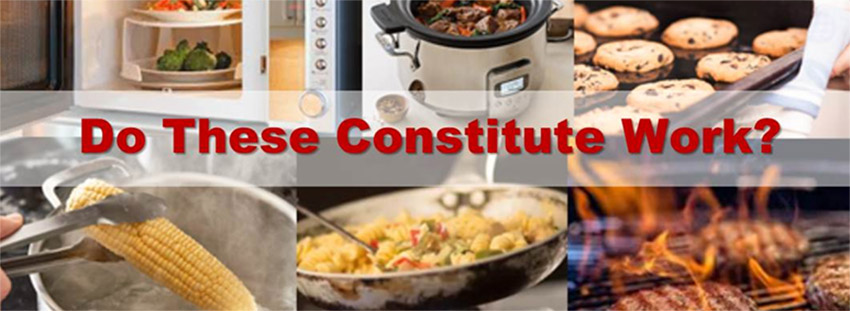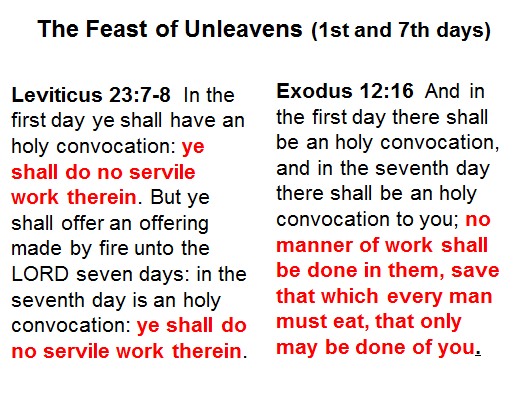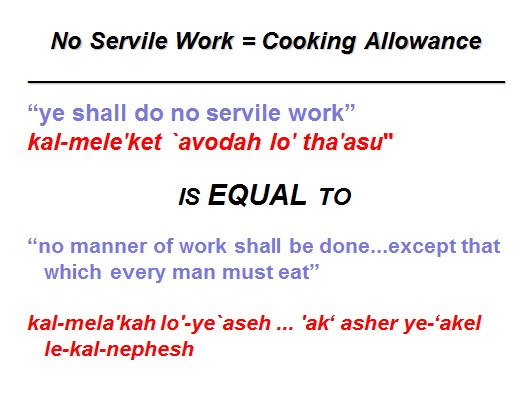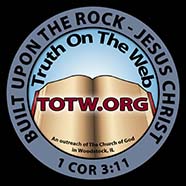
SABBATH - Is Cooking Forbidden?
BRIAN C. HOECK·WEDNESDAY, MAY 15, 2019Not every nuance of Sabbath observance is addressed in Scripture, but the particular issue of cooking or not cooking on Sabbath is indeed addressed. Here are the voices of its witnesses.
Do recall that the Children of Israel were tutored by YHVH in the proper disciplines of Sabbath observance during the 40 years in the wilderness. They were taught a distinction between the Sabbath and the other days of the week by a simple system:
single portions of manna provided on days 1 through 5
double portions of manna on day 6
no manna on day 7 (Sabbath):
Exodus 16:4, 5, 22, 23 Then said the LORD unto Moses, 'Behold, I will rain bread from heaven for you; and the people shall go out and gather a certain rate every day, that I may prove them, whether they will walk in My law, or no. And it shall come to pass, that on the sixth day they shall prepare that which they bring in; and it shall be twice as much as they gather daily'...And it came to pass, that on the sixth day they gathered twice as much bread, two omers for one man: and all the rulers of the congregation came and told Moses. And he said unto them, 'This is that which the LORD hath said, To morrow is the rest of the holy Sabbath unto the LORD: bake that which ye will bake to day, and seethe that ye will seethe; and that which remaineth over lay up for you to be kept until the morning.
YHVH did not want His children to go out on the Sabbath to get food. In fact, He straightly instructed them not to (Exodus 16:25-29). Those who did not obey this injunction were scorned: "How long will you refuse to keep My Commandments?"
YHVH had provided a double portion on day 6 and had given instruction to both gather it, as well as prepare it, that day:
Exodus 16:5 And it shall come to pass, that on the sixth day they shall prepare that which they bring in; and it shall be twice as much as they gather daily. (KJV)
Exodus 16:5 And on the sixth day they are to make ready what they get in, and it will be twice as much as they get on the other days. (BBE)
Exodus 16:5 But on the sixth day of each week they must gather and cook twice as much. (CEV)
This is further expounded in verse 23:
Exodus 16:23 And he said unto them, This is that which the LORD hath said, To morrow is the rest of the holy Sabbath unto the LORD: bake that which ye will bake to day, and seethe that ye will seethe; and that which remaineth over lay up for you to be kept until the morning.
Exodus 16:23 Moses said, "This is what GOD was talking about: Tomorrow is a day of rest, a holy Sabbath to GOD. Whatever you plan to bake, bake today; and whatever you plan to boil, boil today. Then set aside the leftovers until morning. (The Message)
From verse 5 and verse 23 here, we see that they were to gather and prepare (baking, boiling, etc.) twice as much manna on preparation day. This would serve as meals for both preparation day and Sabbath, but all prepared on preparation day.
Simply put, they were instructed to gather a double portion of manna each Preparation Day, and they were to prepare it all that day -- whatever portion of it they wanted boiled, they were to boil it then; whatever portion of it they wanted baked, roasted, fried, etc, they were to roast, bake, and fry it that 6th day.
They were not to go out to get food, or cook it in any manner, on Sabbath. This lesson was driven home week by week (manna, manna, manna, manna, manna, double manna, no manna) for 40 years!
The lesson taught there in deed, was also taught in the instructions for the Sabbath. The Torah informs us that all our work [Hebrew: ma`aseh] is to be done in the six works days leading to Sabbath:
Exodus 23:12 Six days thou shalt do thy work [4639 ma`aseh], and on the seventh day thou shalt rest: that thine ox and thine ass may rest, and the son of thy handmaid, and the stranger, may be refreshed.
This same Hebrew word is used to reference baked goods:
Genesis 40:17 And in the uppermost basket there was of all manner of bakemeats [4639 ma`aseh] for Pharaoh; and the birds did eat them out of the basket upon my head.
In other words, baked goods are the product of labor. It takes ma`aseh to produce them, and ma ‘aseh is not to be done on Sabbath.
Hear also the testimony from the instruction for the High Days of the Feast of Unleavens:
Exodus 12:16 In the first day there shall be to you a holy convocation, and in the seventh day a holy convocation; no manner of work shall be done in them, except that which every man must eat, that only may be done by you.
“no manner of work shall be done” = kal-mela'kah lo'-ye`aseh
The word translated "work" here is the Hebrew word mela'kah.
Is food preparation included as a form of mela’kah? Indeed it is.
If the command to not perform any mela'kah did not include a prohibition of food preparation, then there would be no need for this exception clause that follows in Exodus 12:16:
"save that which every man must eat" = 'ak 'asher ye-'akel le-kal-nephesh
So, a command against mela'kah is a command against all work including the preparation of food.
Since Exodus 12:16 says: "no manner of work shall be done...except that which every man must eat" (kal-mela'kah lo'-ye`aseh ... 'ak 'asher ye-'akel le-kal-nephesh) it shouts out that any day that has the phrase kal-mela'kah lo'-ye`aseh for a prohibition, absolutely outlaws any and all food preparation. Both Sabbath and Atonement carry this prohibition and therefore no manner of food prep, or other work, is lawful upon them:
Leviticus 23:3 Six days shall work be done: but the seventh day is the Sabbath of rest, an holy convocation; ye shall do no work (kal-mela'kah lo'-tasu) therein: it is the Sabbath of the LORD in all your dwellings.
Leviticus 23:28 And ye shall do no work (kal-mela'kah lo'-tasu) in that same day: for it is a Day of Atonement, to make an atonement for you before the LORD your God.
Cooking on the Feast Days
Now, what about the other Appointed Times? Is cooking allowed on the Feasts?
As we saw above in Exodus 12, the High Days of the Feast of Unleavened Bread clearly have an allowance for cooking/preparing food:
Exodus 12:16 In the first day there shall be to you a holy convocation, and in the seventh day a holy convocation; no manner of work shall be done in them, except that which every man must eat, that only may be done by you.
Let us consider a few other translations of this verse for clarity:
Exodus 12:16 And in the first day is a holy convocation, and in the seventh day ye have a holy convocation; any work is not done in them, only that which is eaten by any person--it alone is done by you (YLT)
Exodus 12:16 There will be holy assemblies on the first day and the last day of the festival. You must not do any work on these days. The only work you can do is preparing the food for your meals. (ERV)
Exodus 12:16 You must have a holy assembly on the first day and another one on the seventh. You must not work on these days except to prepare your own meals. That's all you may do. (GW)
Note clearly that the only exception to “no work” is food preparation, and no other type of work is allowed.
These same days are referenced again in Leviticus 23 as follows:
Leviticus 23:7-8 In the first day ye shall have an holy convocation: ye shall do no servile work therein. But ye shall offer an offering made by fire unto the LORD seven days: in the seventh day is an holy convocation: ye shall do no servile work therein.

These two Scriptures define the type of work restriction given to the Paschal High Days in two different terms:
“no manner of work shall be done...except that which every man must eat"
“ye shall do no servile work”
These speak the same truth.
People often wonder what the difference is between “no manner of work” and “no servile work,” and here the Scripture defines it.
The “no servile work” restriction given to the 1st and 7th days of Unleavens in Leviticus 23 can be no greater a restriction than the one stated in Exodus 12:16 for these same days.
Recall that the work restriction of Exodus 12 was given one, and only one, exception to it: the allowance to cook. There was no other allowance.
Some people surmise that “servile work” is reference to what you do for wages, however that definition does not agree with Leviticus 23:7-8 in the light of Exodus 12:16.
IF “no servile work” means you can do work that you don’t get paid for, then that would mean we could, for instance, paint the house on the 1st day of the Feast of Unleavened Bread because Leviticus 23:7 says that we are just restricted from doing “servile work.”
Does Exodus 12:16 allow us to paint the house? No, it doesn’t. What work does it allow us to do? Only one thing: cook.
It is thus evident that the “no servile work” restriction carries this same allowance.

Laying line upon line, it is determined that the Appointed Times which have no "servile work" allowed upon them differ from the seventh day Sabbath and Atonement in that food preparation is allowable upon these days.
This fact is noted by the Jews themselves in their Talmud:
Mishnah. There is no difference between festivals and Sabbath save only in the matter of [preparing] food.11"
footnote: "(11) Lit., ‘food of the person’. I.e., that food for the day may be cooked on festivals but not on Sabbath." [Babylonian Talmud (Soncino edition)- Mas. Megilah 7b]
Please note that cooking on the Feast days is an allowance, not a requirement. You are not required to cook on the Feast days, but you are required to not cook on Sabbath and Yom Kippur. If one of the Holy Days that allows cooking falls on the Sabbath day, the Sabbath restriction overrides the Holy Day cooking allowance.
Keep the Holy Days wholly!
©2010, 2019 Truth On The Web Ministries

